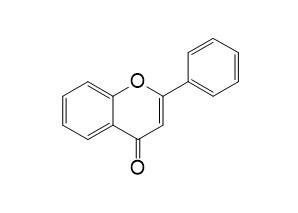Flavone
Flavone induces effectively programmed cell death, differentiation, and growth inhibition in transformed colonocytes by acting at the mRNA levels of genes involved in these processes. Because these genes play a crucial role in colon carcinogenesis, flavone may prove to be a potent new cytostatic compound with improved selectivity toward transformed cells.
Inquire / Order:
manager@chemfaces.com
Technical Inquiries:
service@chemfaces.com
Tel:
+86-27-84237783
Fax:
+86-27-84254680
Address:
1 Building, No. 83, CheCheng Rd., Wuhan Economic and Technological Development Zone, Wuhan, Hubei 430056, PRC
Providing storage is as stated on the product vial and the vial is kept tightly sealed, the product can be stored for up to
24 months(2-8C).
Wherever possible, you should prepare and use solutions on the same day. However, if you need to make up stock solutions in advance, we recommend that you store the solution as aliquots in tightly sealed vials at -20C. Generally, these will be useable for up to two weeks. Before use, and prior to opening the vial we recommend that you allow your product to equilibrate to room temperature for at least 1 hour.
Need more advice on solubility, usage and handling? Please email to: service@chemfaces.com
The packaging of the product may have turned upside down during transportation, resulting in the natural compounds adhering to the neck or cap of the vial. take the vial out of its packaging and gently shake to let the compounds fall to the bottom of the vial. for liquid products, centrifuge at 200-500 RPM to gather the liquid at the bottom of the vial. try to avoid loss or contamination during handling.
Sci Rep.2019, 9(1):6429
Hanoi University of Pharmacy2023, 14(1):30-39.
Evid Based Complement Alternat Med.2021, 2021:8850744.
J Korean Soc Food Sci Nutr2023, 52(11):1101-1110
Nutrients.2022, 14(19):4170.
Fundam. Toxicol. Sci.2024, 11(4):197-204
J Appl Biol Chem.2024, 67:33,238-244
Toxicol In Vitro.2019, 59:161-178
Int J Vitam Nutr Res.2022, doi: 10.1024.
Dent Mater J. 2024, dmj.2023-294.
Related and Featured Products
Cancer Research, 2000, 60(14):3823-31.
Dietary Flavone Is a Potent Apoptosis Inducer in Human Colon Carcinoma Cells.[Reference:
WebLink]
Flavonoids are polyphenolic compounds that occur ubiquitously in plants. They are discussed to represent cancer preventive food components in a human diet that is rich in fruits and vegetables.
METHODS AND RESULTS:
To understand the molecular basis of the putative anticancer activity of flavonoids, we investigated whether and how the core structure of the Flavones, 2-phenyl-4H-1-benzopyran-4-one (Flavone) affects proliferation, differentiation, and apoptosis in HT-29 human colon cancer cells. Moreover, the effects of Flavone in transformed epithelial cells were compared with those obtained in nontransformed primary mouse colonocytes. Proliferation, differentiation, and apoptosis in transformed as well as nontransformed colon cells were measured by fluorescence-based techniques. Apoptosis was also determined by changes in membrane permeability, FACScan analysis, and detection of DNA fragmentation. Semiquantitative reverse transcription PCR was performed to assess the effects of Flavone on transcript levels. Flavone was found to reduce cell proliferation in HT-29 cells with an EC(50) value of 54.8 +/- 1.3 microM and to potently induce differentiation as well as apoptosis. The flavonoid proved to be a stronger apoptosis inducer than the clinically established antitumor agent camptothecin. The effects of Flavone in HT-29 cells were associated with changed mRNA levels of cell-cycle- and apoptosis-related genes including cyclooxygenase-2 (COX-2), nuclear transcription factor kappaB (NF-kappaB), and bcl-X(L). Moreover, Flavone, but not camptothecin, displayed a high selectivity for the induction of apoptosis and of growth inhibition only in the transformed colonocytes.
CONCLUSIONS:
In conclusion, the plant polyphenol Flavone induces effectively programmed cell death, differentiation, and growth inhibition in transformed colonocytes by acting at the mRNA levels of genes involved in these processes. Because these genes play a crucial role in colon carcinogenesis, Flavone may prove to be a potent new cytostatic compound with improved selectivity toward transformed cells.



